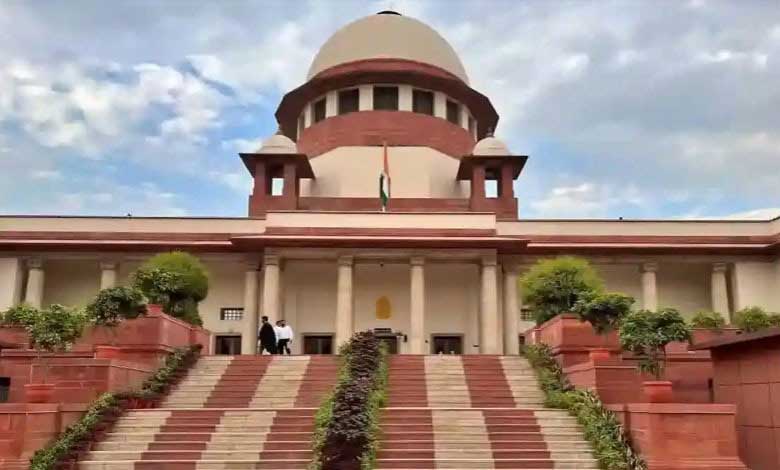Supreme Court Stays Defamation Proceedings Against Rahul Gandhi in Amit Shah Remarks Case
The Supreme Court has stayed defamation proceedings against Rahul Gandhi over his alleged remarks about Amit Shah, questioning the validity of a third-party filing the case. The legal battle continues.

New Delhi: The Supreme Court of India has intervened in the ongoing defamation case against Congress MP Rahul Gandhi, staying the trial court proceedings that were filed by a BJP worker over Gandhi’s alleged defamatory remarks about Union Home Minister Amit Shah.
In an interim order passed on Monday, the apex court directed the halting of the defamation proceedings, citing that the case involved an issue of whether only an aggrieved person, rather than a third party, can initiate a criminal defamation complaint.
Defamation Case Background: Rahul Gandhi’s Remarks on Amit Shah
The defamation case stems from Rahul Gandhi’s remarks made during a public speech in Chaibasa, Jharkhand, ahead of the 2019 Lok Sabha elections.
During the speech, Gandhi called Amit Shah a “murder accused,” leading to the filing of a defamation complaint by Navin Jha, a BJP worker.
The comment sparked controversy, as it was perceived as an accusation against Amit Shah’s integrity, particularly in connection with his role in various legal matters.
Supreme Court’s Intervention in the Case
The Supreme Court bench, consisting of Justice Vikram Nath and Justice Sandeep Mehta, observed the submission made by Rahul Gandhi’s legal team, which questioned whether a third party could file a criminal defamation complaint on behalf of an alleged aggrieved party.
The bench remarked, “If you are not the person aggrieved, how can you have a proxy filing of complaint?” In response, the court ordered the stay of all proceedings in the defamation case until further orders, emphasizing the importance of the aggrieved party’s direct involvement in initiating such cases.
The Court further issued a notice to the State of Jharkhand and the complainant, Navin Jha, indicating that the legal proceedings would remain on hold for the time being.
Earlier Legal Developments in the Defamation Case
Before the Supreme Court’s intervention, the Jharkhand High Court had dismissed Rahul Gandhi’s plea to quash the defamation case. In February of the previous year, the High Court had ruled that the defamation case filed by Navin Jha could proceed.
The Court deemed Gandhi’s remarks to be prima facie defamatory and observed that a prima facie case was made out under Sections 499 and 500 of the Indian Penal Code (IPC), which deal with defamation.
The Jharkhand High Court had also taken note of Gandhi’s statements accusing the BJP leadership of being “liars” and “drunk with power,” claiming that the BJP could accept an individual accused of murder as their leader, but such a situation would never be acceptable in the Congress party.
The High Court noted that these statements were defamatory in nature and could potentially harm the reputation of BJP leaders and workers.
The Legal Implications of the Case
The defamation case revolves around the interpretation of Indian defamation laws, specifically regarding who can initiate a defamation complaint. Under Indian law, defamation can be considered both a civil and a criminal offense.
However, the person who feels personally aggrieved by the alleged defamation is typically the one allowed to file a case. In this case, the Supreme Court has raised important questions about whether a proxy or third party, who is not directly impacted by the remarks, has the right to file such a case on behalf of an aggrieved individual.
The Court’s decision to stay the trial court proceedings comes after considering the legal arguments and examining the nature of the complaint, signaling the importance of ensuring that defamation cases are initiated by those who have directly suffered harm.
Political Context and Repercussions
This case has significant political implications as it involves two major political figures: Rahul Gandhi, a prominent leader of the Indian National Congress, and Amit Shah, the current Union Home Minister and a senior leader of the Bharatiya Janata Party (BJP).
The remarks made by Gandhi have stirred considerable political debate, with the BJP accusing Gandhi of making false and defamatory statements about Shah, while the Congress party has alleged that the case is politically motivated.
As the legal proceedings continue to unfold, the case will likely remain a point of contention in the larger political discourse surrounding free speech, defamation, and political rivalry.
Also Read | Congress Files Application in Supreme Court Supporting Places of Worship Act, 1991
Next Steps and Legal Outlook
With the Supreme Court’s stay on the defamation proceedings, the future of the case hinges on the forthcoming hearings and decisions. The Court has issued notices to the state and the complainant, signaling that the legal battle is far from over.
For now, the defamation case remains on hold, and the legal teams representing both sides will likely await further orders from the Supreme Court.
This case underscores the ongoing tension between political leaders and the legal system, where defamation allegations often intersect with broader political battles.
It also raises important questions about the boundaries of free speech and the legal framework for addressing defamatory statements made by public figures.
